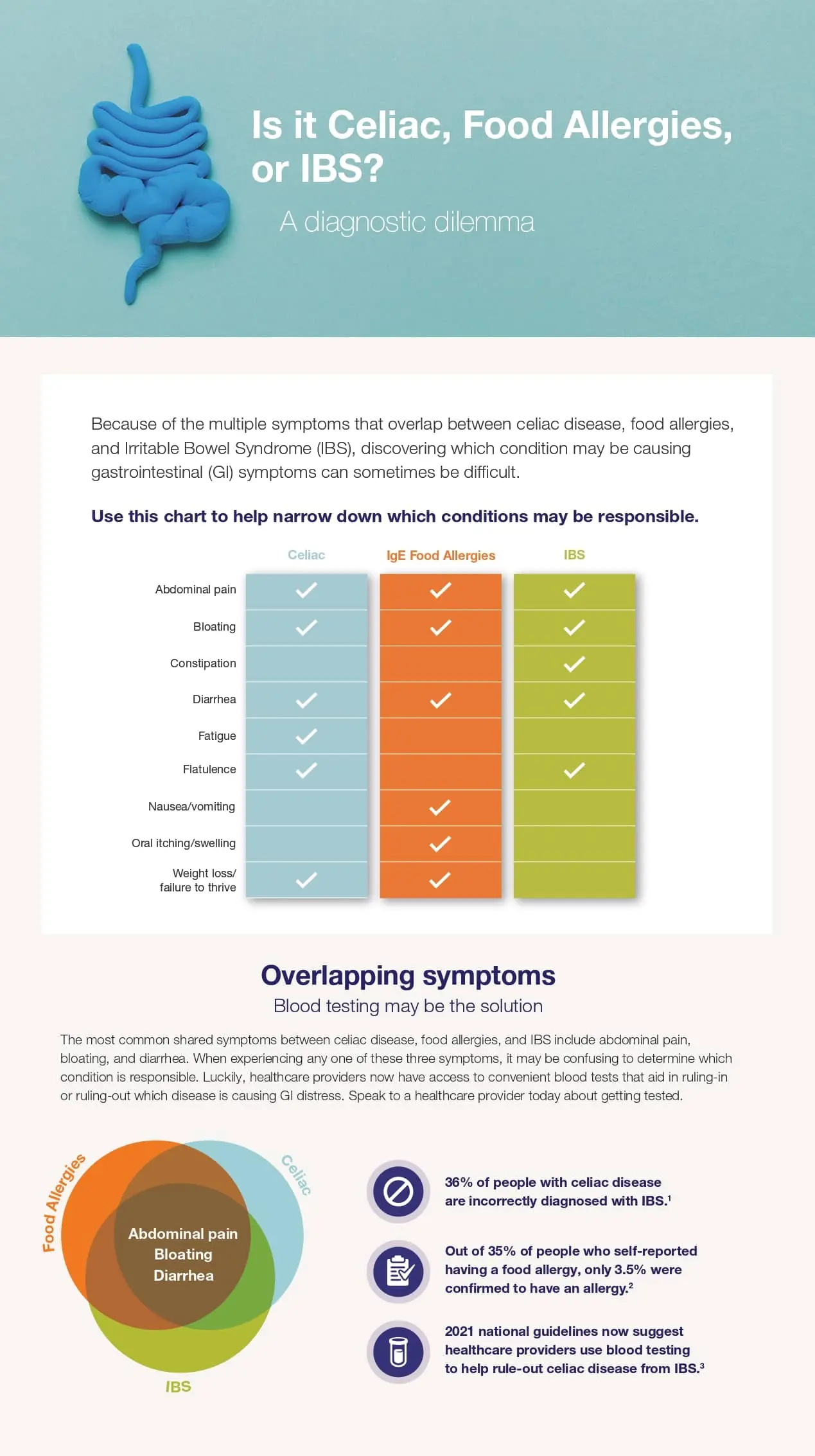Celiac Disease Test Kit
Discovering what condition may be causing gastrointestinal (GI) symptoms can sometimes be difficult. Convenient blood tests can aid in ruling-in, or ruling-out, which disease is causing GI distress.
Who should take this test and why it’s essential:
If you are experiencing negative health symptoms when eating foods that contain gluten, you are a good candidate for the MLD Celiac Disease At Home Test
Out Of Stock
- FSA/HSA Accounts Accepted

Choose How You'd Like To Collect Your Sample
*Receive guidance on using our QuickDraw collection device effectively with a free virtual appointment

QuickDraw
Collection Method
Description
Our Quick Draw device makes sample collection easy, fast and pain free.
Benefits
- Painless
- Free virtual assistance with collection
- Complete blood results from a single microtainer
- Fast turn-around of results
- Free overnight return shipping
$129.99

Finger Stick
Collection Method
Description
For those looking for a low cost option, we offer a traditional Finger Stick collection method with a lancet collection device.
Benefits
- Lower cost, although with low to moderate pain
- Complete blood results from a single microtainer
- Fast turn-around of results
- Free overnight return shipping
$99.99
What this Test measures
Celiac Disease
Celiac disease is an autoimmune disorder that affects about 1 in 100 people worldwide. It occurs when gluten is ingested and triggers an immune response that attacks the small intestine. This can cause damage to the intestinal lining and prevent the absorption of nutrients, leading to a range of symptoms. However, celiac disease can be challenging to diagnose because it affects people differently, and the symptoms can be similar to other conditions, such as food sensitivity or irritable bowel syndrome (IBS). It is estimated that up to 83% of people with celiac disease are undiagnosed or misdiagnosed, leading to ongoing health problems if the condition is not treated correctly.
A simple blood test can detect whether you have harmful antibodies in your blood that attack your own body in response to gluten consumption.
- Tissue Transglutaminase (tTG) IgA
- Deamidated Gliadin IgA
- Tissue Transglutaminase (tTG) IgG
- Deamidated Gliadin IgG


How At-Home Testing Works

Step One
Select The Test That's Right For You
Collect your own lab sample anytime, anywhere through an easy-to-use test kit that’s shipped direct to you.

Step Two
Collect And Return Your Sample
Quickly collect your sample from the comfort of your home using our ground-breaking Quick Draw device or traditional finger stick lancet.

Step Three
View YourResults
Your lab results will be available on your personal online dashboard. Results are in an easy-to-understand educational format that helps you manage your health.

We are a REAL LAB,not a marketing company
All tests are processed through our university backed, CLIA certified labs and HIPAA secure results are delivered in real time. After your test is processed, we offer in-depth results to not only help you make important decisions about your health in conjunction with your treating physician or medical team, but solutions to any health issues that may be discovered during the process.
Questions? We Have Answers.
Celiac disease is a chronic and multiorgan autoimmune disease that affects the small bowel in genetically predisposed persons due to the ingestion of gluten. It can present a wide range of symptoms such as anemia, vague abdominal symptoms, esophagitis, neuropathy, ataxia, depression, short stature, osteomalacia, and multiple others. For the majority of patients, their celiac disease remains undiagnosed.
If you are experiencing the following symptoms when eating foods that contain gluten (wheat, rye, barley, triticale), you are a good candidate for the MLD Celiac Disease At Home Test.
Symptoms:
- Abdominal Pain
- Bloating
- Diarrhea
- Fatigue
- Flatulence
- Weight loss/failure to thrive
- Headaches
- Peripheral neuropathy
Those with increased risk for celiac disease typically have a family member with celiac disease, have other autoimmune disorders and/or have Type 1 diabetes.
With a specificity of 98.5%, MLD’s Celiac Disease At Home blood test identifies the presence of the following antibodies:
- Tissue Transglutaminase (tTG) IgA
- Deamidated Gliadin IgA
- Tissue Transglutaminase (tTG) IgG
- Deamidated Gliadin IgG
Your results will indicate whether or not your body is producing certain antibodies – Tissue Transglutaminase (tTG) IgA, Deamidated Gliadin IgA, Tissue Transglutaminase (tTG) IgG, Deamidated Gliadin IgG – that are linked to celiac disease.
Note – only a healthcare provider can diagnose celiac disease by reviewing a patient’s medical history and symptoms and performing additional tests.








